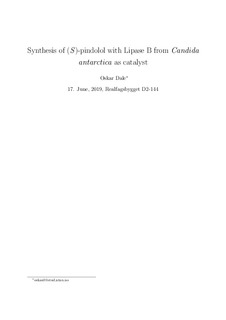Synthesis of (S)-pindolol with Lipase B from Candida antarctica as catalyst
Master thesis
Permanent lenke
http://hdl.handle.net/11250/2624246Utgivelsesdato
2019Metadata
Vis full innførselSamlinger
- Institutt for kjemi [1393]
Sammendrag
Målet med denne oppgaven er å syntetisere enantioren (R)-1-((1H-indol-4-yl)oxy)-3-chloropropan-2-ol ((R)-2) og å syntetisere (S)-pindolol ((S)-5) fra (R)-2. En kjemoenzymatisk syntese av β-blokkeren (S)-pindolol ((S)-5) ble utført fra1H-indol-4-ol (1). Syntesen ble utført ved å først gjøre en organisk syntese for å syntetiserere 1-((1H-indol-4-yl)oxy)-3-chloropropan-2-ol (2) fra 1H-indol-4-ol (1). Dette ga 76 % utbytte av ren 2 over to reaksjonssteg etter rensing med flash kolonne. Enzymet Candida antarctica Lipase B (CALB) ble brukt som en stereoselektiv katalysator for å lage (R)-1-((1H-indol-4-yl)oxy)-3-chloropropan-2-ol ((R)-2) og (S)-1-((1H-indol-4-yl)oxy)-3-chloropropan-2-yl butyrate ((S)-4) fra en rasemiskblanding av 2. Det siste steget gikk ut på å syntetisere (S)-pindolol ((S)-5) fra(R)-1-((1H-indol-4-yl)oxy)-3-chloropropan-2-ol ((R)-2).Enzymreaksjonen ble utført ved å reagere 1-((1H-indol-4-yl)oxy)-3-chloropropan-2-ol (2) med vinylbutyrate ved å bruke enzymet CALB som en katalysator i diklor-metane (Skjema 5) for ̊a lage (R)-1-((1H-indol-4-yl)oxy)-3-chloropropan-2-ol ((R)-2) og (S)-1-((1H-indol-4-yl)oxy)-3-chloropropan-2-yl butyrate ((R)-4). Den kinetiske oppløsningen gaveen E-verdi på 46 og ved 50.2% omdannelse var ees og eep verdiene 96 % og 99 %, respektivt. E-verdien og ees ble beregnet med en Rs på 1.08 og er derfor upresis. Den spesifikke rotasjonen av (R)-2 var [α20379]=-10.4◦(MeOH,c=1.00 g/100cm3) og [α20379]= 5.8◦for (R)-4(MeOH, c=1.00 g/100cm3).(R)-1-((1H-Indol-4-yl)oxy)-3-chloropropan-2-ol ((R)-2) reagerte med isopropy-lamine over 24 t for å syntetisere (S)-pindolol ((S)-5). Grunnet små mengder startmateriale, ble ikke produktet renset. Produktet inneholdt urenheter og utbytte er derfor ikke gitt. The goal of this thesis is to synthesize enantiopure (R)-1-((1H-indol-4-yl)oxy)-3-chloropropan-2-ol ((R)-2) and synthesize (S)-pindolol ((S)-5) from it.A chemoenzymatic synthesis of theβ-blocker (S)-pindolol ((S)-5) was performed from 1H-indol-4-ol (1). This synthesis was performed by first doing an organic synthesis to synthesise 1-((1H-indol-4-yl)oxy)-3-chloropropan-2-ol (2) from1H-indol-4-ol (1). This gave a 76 % yield of pure 2 over two reaction steps after purification by flash column. The enzyme Candida antarctica Lipase B (CALB) was used as a stereoselective catalyst to produce (R)-1-((1H-indol-4-yl)oxy)-3-chloropropan-2-ol ((R)-2) and (S)-1-((1H-indol-4-yl)oxy)-3-chloropropan-2-yl butyrate ((S)-4) from the racemic mixture of 2. The last step was to synthesize (S)-pindolol ((S)-5)from (R)-1-((1H-indol-4-yl)oxy)-3-chloropropan-2-ol ((R)-2). The enzyme reaction was performed by reacting 1-((1H-indol-4-yl)oxy)-3-chloropropan-2-ol (2) with vinyl butyrate using the enzyme CALB as a catalyst in dichloromethane (Scheme 5) to make (R)-1-((1H-indol-4-yl)oxy)-3-chloropropan-2-ol ((R)-2) and (S)-1-((1H-indol-4-yl)oxy)-3-chloropropan-2-yl butyrate ((R)-4). The kinetic resolution gave an E-value of 46 and at 50.2% conversion, the ees and eep values were 96 % and 99 %, respectively. The E-value and ees were calculated with an Rs of 1.08 and are therefore imprecise. The specific rotation of (R)-2was [α20379]=-10.4◦(MeOH, c=1.00g/100cm3) and [α20379]= 5.8◦for (R)-4(MeOH, c=1.00g/100cm3).(R)-1-((1H-Indol-4-yl)oxy)-3-chloropropan-2-ol ((R)-2) reacted with isopropy-lamine over 24 h to synthesize (S)-pindolol ((S)-5). Due to small amounts ofstarting material the product was not purified. The product included impuritiesand the yield is therefore not given
